 Petzlover
PetzloverCabecudo Boiadeiro is originated from Brazil but Russian Harlequin Hound is originated from Russia. Cabecudo Boiadeiro may grow 7 cm / 3 inches higher than Russian Harlequin Hound. Cabecudo Boiadeiro may weigh 51 kg / 113 pounds more than Russian Harlequin Hound. Both Cabecudo Boiadeiro and Russian Harlequin Hound has same life span. Both Cabecudo Boiadeiro and Russian Harlequin Hound has almost same litter size. Both Cabecudo Boiadeiro and Russian Harlequin Hound requires Low Maintenance.
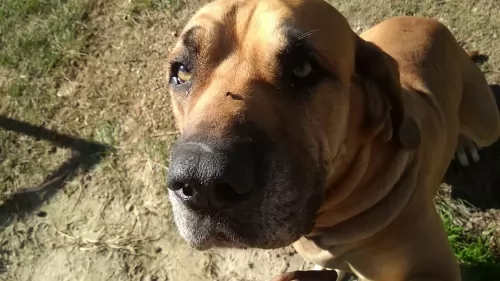 The Cabecudo Boiadeiro has always played an important role in the management of livestock. Stockdogs like this were known in parts of Minas Gerais as early as the 18th century. In fact reports tell us that the Cabecudo has existed since the 16th century as a working dog in the rural parts of Brazil.
The Cabecudo Boiadeiro has always played an important role in the management of livestock. Stockdogs like this were known in parts of Minas Gerais as early as the 18th century. In fact reports tell us that the Cabecudo has existed since the 16th century as a working dog in the rural parts of Brazil.
The Capecudo has remained much the same over the centuries – a dog created as a guardian for large properties, as a game hunter and livestock herder and protector. Today this Molosser dog still drives cattle in Brazil.
The origins of the Russian Harlequin Hound are somewhat vague as there are many Russian hunting hounds and many of them have a similar ancestry.
The Russian Harlequin Hound is an indigenous hound whose origins go back to the 18th century. The first breed standard was published in 1925.
The breed was then developed during the early 1900s – being a mix of Russian Hound and English Foxhound. The Russian Harlequin Hound is a rare dog breed and you will find it almost exclusively in Russia.
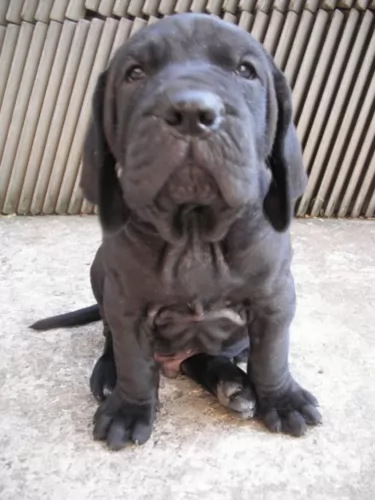 The Brazilian Cabedudo is a strong boned, large dog with a large head and a deep chest. The coat of the dog is short and dense and in wheat-colored shades or fawn shades, while brindle is also in existence. The Cabeçudo Boiadeiro is also known as the Brazilian Mastiff and is a large, imposing dog.
The Brazilian Cabedudo is a strong boned, large dog with a large head and a deep chest. The coat of the dog is short and dense and in wheat-colored shades or fawn shades, while brindle is also in existence. The Cabeçudo Boiadeiro is also known as the Brazilian Mastiff and is a large, imposing dog.
Because the breed was created from a blend of the English Mastiff, the Bulldog and the Bloodhound, not only is this a large dog in height, but a big boned dog as well. He has short to medium length floppy ears and a long tail.
The Brazilian Cabedudo is a courageous dog. When he has been properly trained and socialized, this large dog is capable of becoming an obedient, loving and devoted family pet who is able to get along with children and other pets too. He reserves this gentler side of him for his human family and won’t easily tolerate strangers.
The Russian Harlequin Hound is a medium to large sized dog that stands between 55 – 68cm in height and weighs between 18 – 31kg.
He has a solid build with long, straight legs with a long tail that can be slightly curved. The head is broad and square with medium sized ears which are floppy. The short coat is essentially white with tri-colored markings of white, tan and black.
The Russian Harlequin Hound has an amicable expression to his face and is a friendly social dog breed. He is lively and energetic, and with his hunting background will required a good deal of exercise.
They make great family pets, getting on well with children in the home and making friends with any other pets in the family. He is a gentle dog and with training and socialization is well mannered and obedient.
He loves his human family and wants to spend time with them in their company. He isn't suited to life in the city and a small property, but will require a home with bigger grounds.
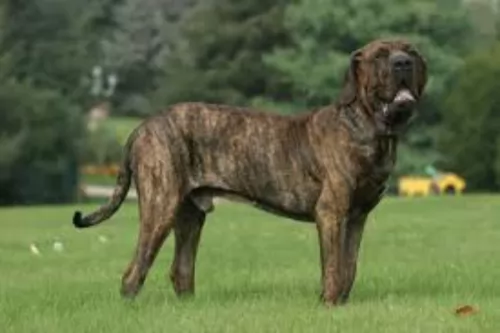 Deciding to become an owner of a dog is a big responsibility, as you are going to have your pet with you for 10 – 15 years at least. There are so many essentials to remember with owning a dog and most dogs are far happier and healthier when allowed to live part of the time indoors with their human family.
Deciding to become an owner of a dog is a big responsibility, as you are going to have your pet with you for 10 – 15 years at least. There are so many essentials to remember with owning a dog and most dogs are far happier and healthier when allowed to live part of the time indoors with their human family.
It's not always easy being a large dog such as the Cabecudo Boiadeiro, as people often assume these mastiff-type dogs are unfriendly and aggressive.
Every dog breed however, is essentially the product of his owners lifestyle and his unique upbringing with them. When this large pet is properly trained and socialized and he is loved and well cared for, he promises to be faithful, devoted, playful and loving – a real friend and protector.
The Russian Harlequin Hound has always been a hunting dog, known for his excellent hunting skills. He isn’t only a good hunting dog, but he makes a good family pet too.
If you’re looking for an unusual dog breed that is also intelligent, loyal and loving, then you might want to consider this Russian Harlequin Hound.
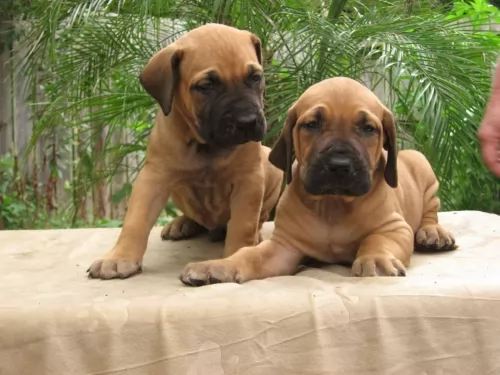 The Cabecudo Boiadeiro is considered a robust breed, used to lots of exercise while herding livestock. With good care and plenty of exercise he can live to 10, 11 or 12 years of age. He is a large breed and this fact alone will ensure that you be aware of some dog illnesses prone to larger breeds.
The Cabecudo Boiadeiro is considered a robust breed, used to lots of exercise while herding livestock. With good care and plenty of exercise he can live to 10, 11 or 12 years of age. He is a large breed and this fact alone will ensure that you be aware of some dog illnesses prone to larger breeds.
This is an orthopedic condition where the hip joints don’t fit properly into the hip joint. Larger breeds such as the Cabecudo Boiadeiro are at a higher risk of getting this orthopaedic disorder.
You’ll see your dog battling to move around and he may not even be able to get up again after lying down. Sometimes a dog might even require surgery. Thankfully, there is testing for hip dysplasia in dogs, and you can ask to see a clearance certificate if you buy your puppy from a so-called reputable breeder.
Progressive retinal atrophy (PRA) is a degenerative eye disorder that can actually lead to blindness in your pet. Night blindness sets in and your dog becomes unsure how to walk in unfamiliar areas, You'll notice that his eyes become gray or cloudy-looking as though there is a film over the eyes. Parent dogs with this eye disease should be spayed or neutered.
Your Russian Harlequin Hound is a rare dog breed that can reach 12 years of age if well cared for. There are some dog ailments that must be watched for. Cancer, ear infections and skin allergies can be problems to look out for. Other troublesome ailments can be -
This is a more common disease with deep-chested dogs, and the deep chested Russian Harlequin Hound is prone to bloat. Gas is trapped in the stomach and the stomach can actually twist. It can be life threatening. Your pet will have a hard, swollen belly and will be restless and salivating. Get him to the vet immediately. He may well require immediate surgery.
This condition is all about problems with the hip joints. It is sad for any dog with this disease as it can be painful for your pet to walk. Inflammation and arthritis can mean your pet being in pain. He can become lame too.
There are anti-inflammatory medications and your vet will suggest other treatments to make sure your pet is as comfortable as can be.
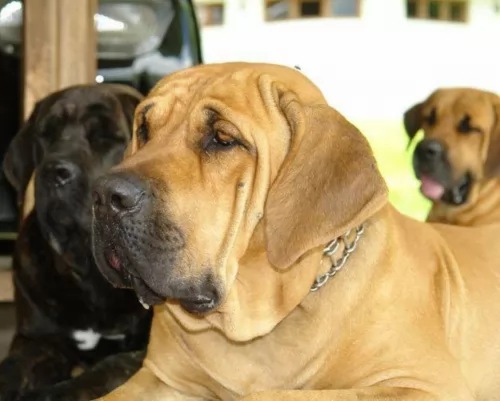 The Cabecudo Boiadeiro is a large breed dog. In spite of his size though, he is surprisingly an active dog. He will need regular exercise such as a brisk walk very day. You can also put aside time to give him some exciting ball games. He is a breed used to working so he will be most unhappy lying around doing nothing.
The Cabecudo Boiadeiro is a large breed dog. In spite of his size though, he is surprisingly an active dog. He will need regular exercise such as a brisk walk very day. You can also put aside time to give him some exciting ball games. He is a breed used to working so he will be most unhappy lying around doing nothing.
If you are going to be feeding your Cabecudo Boiadeiro commercially manufactured good, make sure it is the best quality food. Always go for dog foods which have all the nutrients your large dog requires.
You get wet, dry and raw complete foods and you can give your pet a mix of these. Always make sure that your pet gets some raw meat in from time to time too, otherwise he could battle with skin diseases.
If you aren’t sure how to feed such a large dog, your veterinarian will help you decide which category of food would suit your pet. Clean, cool water is to be provided constantly.
The Russian Harlequin Hound needs both mental and physical stimulation. He is a curious dog and wants to be out and about sniffing around and exploring. He will need to have a walk every day as well as lots of ball- and rope games. He will suit being the pet of a busy, outdoorsy family as opposed to a family of couch potatoes.
The Russian Harlequin Hound is looked upon as a low maintenance dog breed, and with his short, dense coat you can get by with just brushing him twice a week. Because he is such a lover of the outdoors check him over for ticks and fleas when you brush him.
Check inside his ears for redness and infection.
Open his mouth and look for bad, rotting teeth.
Check him over for any unusual lumps.
Make sure his eyes are clear and free of discharge.
Trim his nails.
Every dog should be fed excellent food as this encourages good health. Commercially manufactured dog foods can be wonderfully convenient and nutritious if you get the better quality ones.
Try and include some simple, tasty home-made food to his diet . High-quality dry dog food will provide a balanced diet, but you want to make it a little more tasty for him by giving him some chopped up boiled chicken, brown rice, sweet potatoes, carrots and spinach. This can be added into the dry kibble twice a week.
Try and include some raw meat occasionally. Fresh, cool water should always be available around the clock.